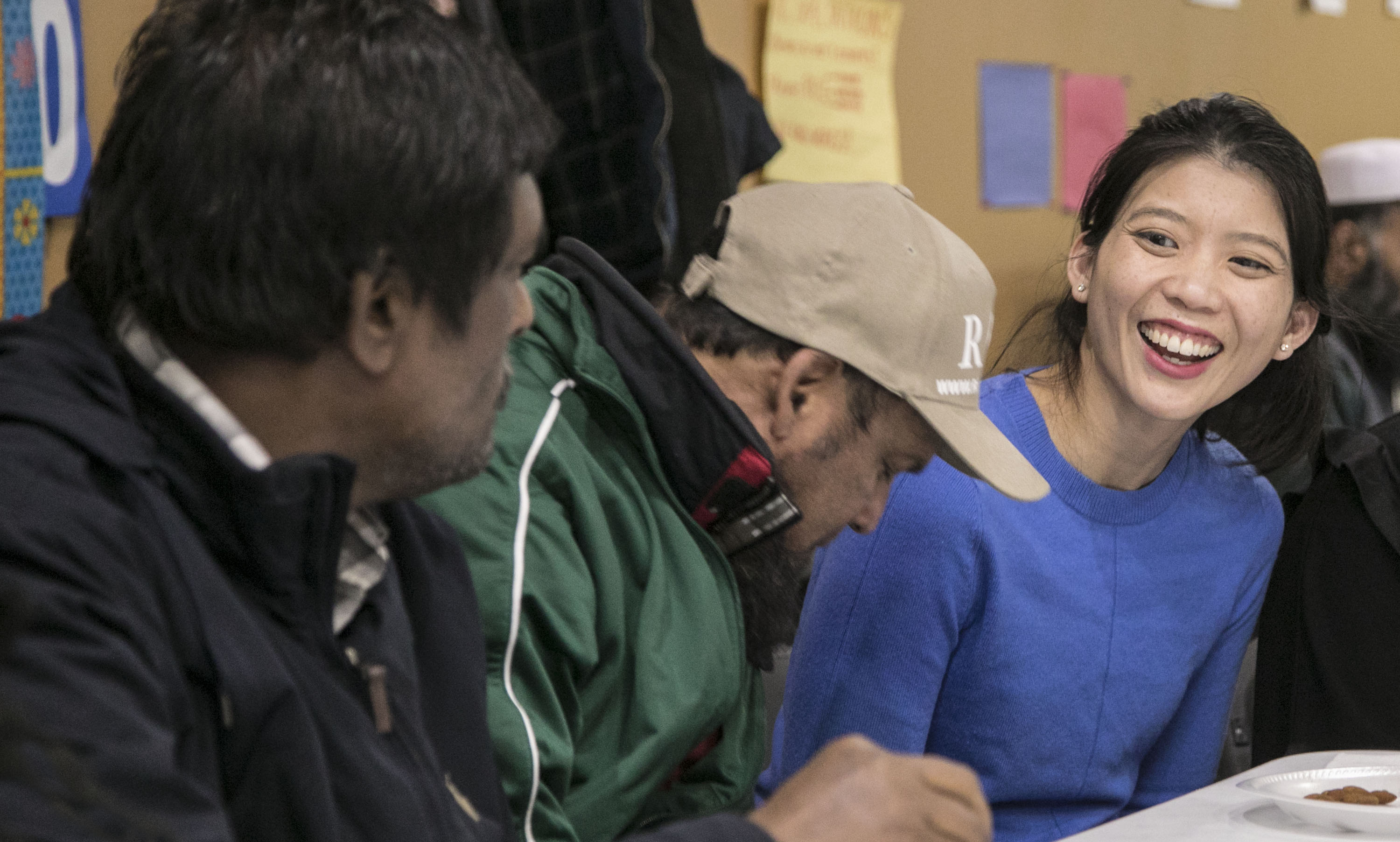 Associate professor of psychology Anne Saw (right) works with immigrant and refugee communities in Chicago. She discusses the mental health toll of racism against Asian American communities and offers resources for taking action. (DePaul University/Jamie Moncrief)
Associate professor of psychology Anne Saw (right) works with immigrant and refugee communities in Chicago. She discusses the mental health toll of racism against Asian American communities and offers resources for taking action. (DePaul University/Jamie Moncrief)Psychologist Anne Saw has been working in immigrant and refugee communities in Chicago since arriving at DePaul in 2014. As a board member of the Asian American Psychological Association, Saw took the lead
drafting testimony in March to a committee of the U.S. House of Representatives on how racism, hate and violence are harming Asian Americans. She also is researching the pandemic’s impact on Asian American, Native Hawaiian and Pacific Islander communities in the U.S., and the effects of hate incidents on Asian Americans. Saw says so far, 69% of respondents to her survey have experienced hate incidents and also reported mental health concerns.
An associate professor in the College of Science and Health, Saw describes the impact of racism and violence on mental health, and offers ways policy-makers and bystanders can stand up for our Asian American neighbors. She is slated to speak at a May 14 event examining Asian immigrants' access to health care and mental health services, co-sponsored by DePaul’s Center for Community Health Equity.
Why was it important to you as a psychologist to lay out for members of Congress how racism and xenophobia toward Asian Americans are surging?
Although events like the shootings in the Atlanta area have brought anti-Asian racism and xenophobia more into public consciousness, Asian Americans often are still overlooked. Thus, we felt it was important to inform members of Congress and other stakeholders anti-Asian hate incidents are, unfortunately, very common. It was important for my co-author, Nellie Tran, an associate professor in counseling and school psychology at San Diego State University and vice president of the Asian American Psychological Association, and I to frame the current context of anti-Asian hate through historical and ecological lenses. We worked to show what is currently happening, is not new but rather consistent, with a long history of anti-Asian racism and xenophobia enacted through our cultural and institutional policies and practices.
How are race-based hate incidents affecting Asian Americans’ health and mental health?
Decades of research show racism affects short- and long-term health and mental health, including for Asian Americans. Racism places individuals at risk for psychological disorders, such as depression, anxiety and post-traumatic stress disorder, and chronic health conditions and risk behaviors, such as diabetes, obesity, and increased tobacco and alcohol use. Given Asian Americans already experience linguistic, cultural and other barriers to care, another important impact is access to healthcare.
How have immigrant and refugee communities in Chicago been disproportionately affected by COVID-19, especially in regards to their mental and physical health?
In Chicago, like across the country, many Asian Americans were struggling before the pandemic. With support from the Steans Center, graduate student Fiona Sun and I conducted qualitative interviews with leaders of Chicago Asian-serving community organizations. That work, along with results from our national needs assessment survey, shows the pandemic has magnified preexisting needs, such as food insecurity, unemployment and underemployment, poor health and mental health and healthcare access. This then compounds with anti-Asian racism to increase health and mental health concerns.
Your group makes policy recommendations to curb anti-discrimination and bias. One of those is a public messaging campaign—how do you believe this can help?
Research shows the rhetoric used by the former president and other public figures, placing blame for COVID-19 on China and using stigmatizing terms such as “China virus” in news and social media outlets, led to the increase in anti-Asian discrimination we all are witnessing. Psychological and other social science research shows stigma and discrimination can be reduced through education that disputes inaccuracies about people who are the targets of discrimination. In other words, to reduce anti-Asian hate, we need to connect with Asian Americans and their historical and contemporary experiences. This requires us to pay attention to, rather than ignore or dismiss, what is happening to Asian Americans and to connect with Asian American experiences.
What is bystander intervention training, and why do you recommend it as a way to address racism?
Bystander intervention training empowers people to act to interrupt racism by equipping them with knowledge and skills to safely step in when they witness it. The bystander intervention training offered by Asian Americans Advancing Justice Chicago and other organizations reminds us hate manifests in many ways, from microaggressions to physical assault, but we are often in positions to step up to make a difference. The training can be applied in other contexts so we can speak up and intervene when we witness hate in all forms.
###
Source:
Anne Saw
asaw@depaul.edu
Media contact:
Kristin Claes Mathews
kristin.mathews@depaul.edu
312-241-9856